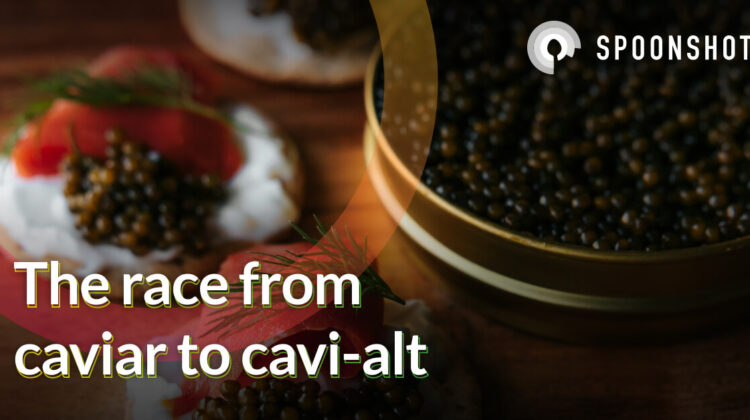
We guessed it would only be a matter of time before enterprising souls gave the luxury fish eggs the vegan treatment. And why not? Regular eggs have firmly established themselves in the plant-based domain. And like their bigger, “fowl”-er counterparts, the plant-based caviar brands position themselves as sustainable alternatives to the original. Seaweed is a favorite base ingredient and molecular gastronomy techniques like spherification help to fashion seaweed into the little globules.
Cavi.art is a Danish company that makes vegan caviar with sustainably harvested kelp seaweed and various micronutrients. The company’s kelp pearl products can be used to replace roe of lumpfish, cod, flying fish, herring, salmon, trout, sturgeon, and vendace. Cavi.art has plant-based alternatives for masago (capelin roe) and tobiko (flying fish roe) for sushi. The caviar alternatives come in different colors based on the type of fish eggs they are meant to mimic. The products are all said to be free from gluten, soy, and cholesterol.
Source: Cavi.art
Zeroe Vegan Caviar, another Danish company, makes shelf-stable caviar using seaweed “grown naturally off the coast of France”. This product is made by suspending seaweed in clean water before extracting and forming it into spheres. It also uses a number of ingredients to boost the flavor, such as black pepper, cayenne, dill, leek, tarragon, and turmeric, all sourced from across Europe.
Source: Zereo Vegan Caviar
The latest in the list is from Vancouver-based Modern Plant Based Foods Inc. It has just introduced (in Jan 2024) a line of “Vegan Kaviar” products made from seaweed with three variants:
- Alternative to caviar with a wasabi twist
- Alternative to original Beluga caviar
- Alternative to traditional salmon roe
Source: Modern Plant Based Foods Inc
These are not the only companies looking at plant based caviar – a supermarket chain has launched a private-label version and even a caviar company has branched out into the vegan space. For example, Dutch caviar brand Cavinoir has two vegan products – one black-colored variant mimicking the original and a lox-style orange product.
Source: Cavinoir
Vegan caviar just… works
…Not necessarily in terms of taste. In fact, as with most plant-based versions of animal products, the taste and texture may not be as satisfying as the real thing. However, there is a growing need for this alternative, a case Spoonshot made way back in 2022. Read our white paper on the need for seafood alternatives.
There are two main reasons for the plant-based alternative to caviar (and seafood in general):
1. Sustainability
Fish and seafood are immensely popular the world over for their taste and for the various health benefits associated with them, not to mention the employment they provide to millions in developing countries. But our fondness for fish and seafood has taken a significant toll on the world’s fish stocks. Thanks to this, we’ve seen a rise in unsustainable fishing practices, overfishing, and a general lack of respect for what we discard into the oceans and take out. According to the UN, around 90% of the world’s marine fish stocks have now been “fully exploited, overexploited, or depleted”.
The story with freshwater fish is no different. In particular, sturgeon stocks are in pretty bad shape. Sturgeon is the source of the highest quality of caviar and unsurprisingly is a much sought-after fish species. The International Union for Conservation of Nature and Natural Resources lists more than half of the remaining sturgeon species as critically endangered.
These massive guys have been around since the dinosaurs but appear to have met their match with us. The WWF says there are very few large sturgeon left, and even fewer that reproduce naturally. Some species have even become extinct thanks to various human activities in the rivers that are their breeding grounds.
In addition, the extraction of the roe is being increasingly seen as inhumane to the various fish species involved, and that has been enough for consumers to consider animal-free substitutes.
And so the demand for sustainable seafood/fish alternatives is on the rise. Spoonshot’s analysis of news articles about sustainable fish and seafood has been on the rise for the last couple of years.
Between Jan 2020 and Nov 2023, business interest in sustainable seafood grew by 143.1%, while consumer interest went up by 195.3%. But there is a lot more activity from businesses in this space, most likely as they anticipated growing demand from consumers as the overall plant-based trend took root.
Business and consumer interest in sustainable seafood
Source: Spoonshot
2. Price
If price is not what you think of first with caviar, then you, my friend, have FU money (pardon my abbreviated French). Congratulations. At 200 bucks a pop (i.e., an ounce of high-quality Beluga caviar), that’s a luxury that many of us can’t even afford to think of. Even not-so-high quality caviars are expensive, starting from US$45 an ounce.
So one of the selling points for the vegan caviar brands is affordability vis-à-vis the actual stuff. There are brands available at the equivalent of US$1.20 for an ounce and others working their way up to around US$15, a far shout from the original.
This is a nice change of pace though, from the usual complaints about how plant-based alternatives are so much more expensive than their animal counterparts. As far as I can tell, this is one of the very few – if not only – categories where the vegan product is cheaper on average than the animal one.
As consumers today are more than happy to immerse themselves in the plant-based world, there are plenty of food service operators using vegan caviar in high-end dishes to enhance the luxury aspect of the ingredient.

The surprising popularity of caviar
You’re probably wondering why the heck we’re even talking about caviar, let alone the vegan stuff.
Well, you can thank (or blame) Gen Z for that. The young ‘uns love it and are making it known all over social media. Caviar bumps are the latest fad and entail putting a dollop of caviar on the little crook between the thumb and index finger and snorting eating that. Though this is not exactly a new method of eating caviar.
On TikTok, #Caviarbumps has over 15 million views, and apparently caviar sales have gone up 76% since 2020. Its presence – in restaurants and at home – has increased and chefs expect the demand for caviar to continue. The global caviar market was worth US$465 million in 2022 and is projected to grow to US$975 million by 2033, according to data from Fact.MR.
Source: Instagram
There are some interesting drivers for this trend.
- While wild caviar is still mind-blowingly expensive, prices have come down for farmed caviar. This has made caviar more accessible now.
- Caviar is seen as an incredibly nutritious food, high in proteins and omega-3 fatty acids, which support critical brain functions. In fact, this has resulted in parents buying caviar for children as young as 18 months.
- And for the experience junkies, this is just another way to flex for the following.
Consumer interest in caviar has gone up by 118.6% since the start of 2021
Source: Spoonshot
In fact, even brands are taking advantage of the popularity of caviar and are doing interesting promos to increase the accessibility and approachability of the product. For example, Pringles and The Caviar Company have partnered to launch a co-branded kit featuring 3 Pringles chips variants and 2 types of caviar for a cool price of US$140.
Source: The Caviar Co.
If this is indeed the trajectory for caviar, we may very well be looking at a dearth of an already scarce food, and so alternatives are a no-brainer. Caviar has a moderate popularity score of 5.82 among consumers and interestingly “vegan” is the second most popular claim associated with it and plant-based, the fourth.
Source: Spoonshot
Plant-based versions can help a wider range of consumers experience (sort of) what the fuss is about caviar at a much more affordable price.
But given how alternatives to meat and other animal products have also moved to cell-based versions, it won’t be long before the same happens to caviar. In fact, there are companies that are working on cell-based caviar cultivation, though they may be quite sometime away before commercialization.
In the meantime, a plant-based option doesn’t sound all that bad…



Leave a Reply